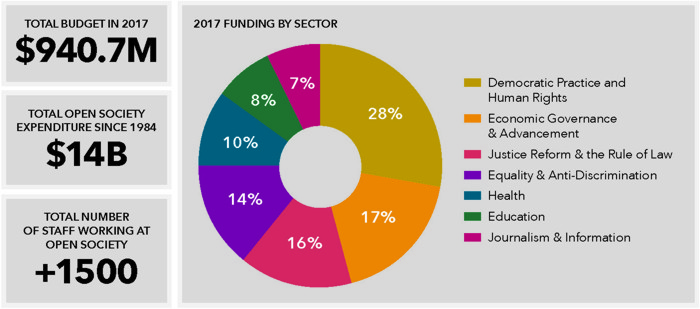A BRIEF HISTORY
The Open Society Foundations were founded by George Soros, one of the world’s foremost
philanthropists, who since 1984 has given away $14 billion of a personal fortune made in the
financial markets.
Open Society has supported individuals and organizations across the globe fighting for freedom
of expression, transparency, accountable government, and for societies that promote justice and
equality. This giving has often focused on those who face discrimination purely for who they are,
such as Europe’s Roma people, and others pushed to the margins of mainstream society.
Soros has experienced such intolerance first-hand. Born in Hungary in 1930, he lived through the
Nazi occupation, which resulted in the murder of over 500,000 Hungarian Jews. In 1947, as the
Communists took power, Soros left Budapest for London and then emigrated to the United States,
entering the world of finance and investments where he was to make his fortune.
Soros began his philanthropy in 1979, giving scholarships to black South Africans under apartheid.
In the 1980s, he helped promote the open exchange of ideas in Communist Hungary; after the fall of
the Berlin Wall, he sought to strengthen democratic practice and institutions across East and Central
Europe.
With the Cold War over, he expanded his philanthropy to the United States, Africa, and Asia, supporting a
vast array of new efforts to create more accountable, transparent, and democratic societies.
QUICK FACTS

9 FACTS ABOUT THE OPEN SOCIETY FOUNDATIONS
01 The Foundations today include twenty three national and regional Foundations, each with its own local board whose members oversee the work and shape funding priorities to meet local needs.
02 The first foundation was established in Hungary in 1984, and the newest opened in Myanmar in 2016.
03 The Foundations provide no more than 33% of the funding to the vast majority of the organizations we work with, in order to ensure they maintain their autonomy and establish a sound financial basis for their operations.
04 The Foundations are the second largest private philanthropy after the Bill and Melinda Gates Foundation. The continuing tradition of philanthropic giving by successful businessmen in the U.S. dates back to individuals such as Andrew Carnegie and the Rockefeller and Ford families.
05 The Foundations have been the largest private funder of efforts to support Europe’s Roma minority.
06 Beginning in 1993, we provided tens of millions of dollars for humanitarian aid and relief efforts during the wars in the countries of the former Yugoslavia, especially in besieged Sarajevo.
07 We have been working in the United States since 1996. Our U.S. programs account for around 17% of our funding work, which includes supporting reform of the criminal justice system and drug laws, strengthening democratic participation, and supporting humane immigration laws.
08 Again and again, the Foundations have joined policy debate on controversial issues that other funders might avoid. We are proud to work with people who find themselves being shunned by society simply because of who they are.
09 Our name reflects the influence on our founder of the philosophy of Karl Popper. In his book Open Society and Its Enemies, Popper argues that no philosophy or ideology is the final arbiter of truth, and that societies can only flourish when they allow for democratic governance, freedom of expression, and respect for individual rights.
